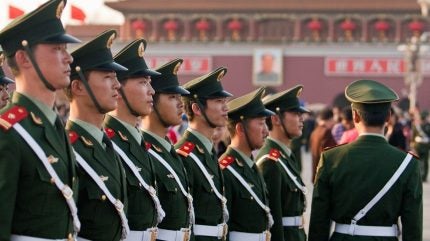
The US Department of Defense (DoD), has identified more than 50 Chinese companies and their subsidiaries with an American presence, as entities working to advance the armed forces of the People’s Republic of China (PRC).
As of 7 January 2025, these include familiar technology brands such as CATL, Huawei, and Tencent.
As the commercial sector drives innovation, the line between civil and military has blurred. The overlap presents the PRC with an opportunity to surpass the US technologically through ‘Military-Civilian Fusion’, or MCF strategy.
Under MCF, the DoD says that China is acquiring the intellectual property, key research, and technological advances around the world from researchers, scholars, and private industry to realise its own military aims.
The PRC codified the strategy in 2015, though officials have referenced the policy from as early as 2007. MCF evolved from the Civil-Military Integration concept, or CMI, which represents a shift in focus from defence technology to a balance in developments in both sectors.
To counter this, in accordance with Section 1260H of the National Defense Authorization Act (2021), the DoD issues an annual list of these ‘fused’ businesses it considers “Chinese military companies,” and will do so until at least 2030.

US Tariffs are shifting - will you react or anticipate?
Don’t let policy changes catch you off guard. Stay proactive with real-time data and expert analysis.
By GlobalDataThe US government will not impose any sanctions on the companies but the move does prohibit the DoD from working with them in any capacity, and it will serve to warn others of their perceived ties with the People’s Liberation Army.
Market presence
Strict trade barriers prevent exports between the US and China. However, it seems that the PRC aim to gain some insight into US dual-use innovation for its own military purposes or for strategic intelligence.
Russia, another strategic rival to the US, has similarly derived US-manufactured components from American companies for use in Russian weapons fired against Ukraine’s Armed Forces. More than 40% of nearly 2,500 components analysed in Russian weapons on the Ukrainian battlefield were made by four US suppliers.
According to GlobalData’s thematic intelligence report on ‘Advanced Materials in Aerospace and Defense’, Chinese defence companies including AVIC, BIAM, and CASC – the first of which is also listed in the MCF registry for 2024 – have relied on western academia to support research into UHT materials and other elements in their hypersonic weapons development. Thus:
“Concerns over national security and intellectual property theft are pushing many institutions to rethink their relationships with firms linked to the Chinese military,” GlobalData confirmed.
However, the PRC have also placed similar restrictions on US companies, particularly when it comes to their access to critical minerals. On 2 January, the Chinese Ministry of Commerce placed 28 American companies – including Raytheon, Boeing and Lockheed Martin – on an export controls list.
“China is opaque, so how exactly Tencent works with the Chinese military isn’t clear.”
James Marques, GlobalData defence analyst
Nevertheless, the DoD labelled big technology players such as Tencent as ‘military companies’ without providing any specific reasons.
“‘Dual-use technology’ is a big concept in diplomacy and export control, but I suppose with tech companies like Tencent it’s always a bit more nebulous because it’s often referring to software, not physical products,” observed James Marques, a GlobalData defence analyst.
“China is opaque, so how exactly Tencent works with the Chinese military isn’t clear. But ultimately for the time being, this is the DoD expressing a formal opinion that may inform the actions of other government departments such as the Treasury Department, but there have been no active steps yet.”
Not just technology
The DoD lists Chinese companies it suspects are MCF entities in other critical industry sectors, such as shipbuilding and the maritime sector. This includes COSCO and two of its subsidiaries.
In the past year, the US government has cast doubt over the security of US port infrastructure.

In a session of the Select Committee on the Chinese Communist Party (CCP) in September 2024, policymakers determined that “the PRC has embedded itself into a critical component of the US economy by dominating global market share of port cranes through investment campaigns.”
US legislators fear the PRC’s control of port cranes for both the US and its allies. In singling out COSCO, the Committee’s report pointed to the company’s notable investment in the Port of Los Angeles’ container terminal. However, the Committee members voiced other concerns too:
“As a state-owned enterprise, COSCO Shipping has direct ties to the PRC and has reportedly modified its civilian ferries for use [in] amphibious operations – potentially for use in a future Taiwan invasion.”



